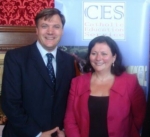03 March 2009
Catholic Church slams new code of conduct forcing teachers to promote Islam and gay rights
 The Roman Catholic Church has severely criticised a proposed new code of conduct for teachers which it says will force Christian schools to actively promote Islam and gay rights
The Roman Catholic Church has severely criticised a proposed new code of conduct for teachers which it says will force Christian schools to actively promote Islam and gay rights
The Bishops’ Conference of England and Wales has warned the General Teaching Council, by the professional regulatory body, that many teachers will quit the profession because they will not be able to accept the revised code of conduct in good conscience.
Their advisers say the code would also seriously undermine the religious character of church schools by imposing on them a hostile form of secular morality.
The legally-binding code would discriminate against Christian teachers in recruitment and in the classroom, they say.
Principle 4 of the code demands that teachers ‘proactively challenge discrimination’ and ‘promote equality and value diversity in all their professional relationships and interactions’ before they can be registered.
It means that campaigners can complain if teachers fail to observe the new demands and that teachers and schools can be punished if a complaint is upheld.
Oona Stannard, head of the Catholic Education Service, an agency of the bishops’ conference, told the GTC in a written submission that ‘there was an understandable fear that the call to “proactively challenge discrimination” could be used to oppose faith schools per se, and the rights that they have in law, for example, to select leaders who are of the faith’.
‘This anxiety extends similarly to the direction to “promote equality”,’ Miss Stannard said.
‘It would be unacceptable to expect anyone to be required to promote something contrary to their own faith beliefs and, indeed, it would not be possible for a person of faith to promote another faith – this is a matter of conscience.’
Miss Stannard added that there were grave concerns in the Church over the question of whether Catholic teachers would in good conscience feel able to register under the new code.
This means they would either quit the profession or would be dissuaded from entering in the first place, heightening the recruitment crisis already afflicting many schools.
The code proposed by the GTC would be binding on all schools, including the 2,300 primary and secondary schools run by the Catholic Church and the 4,660 run by the Church of England.
The GTC is insisting that all teachers will have to sign up to the new code before they can practice.
The code will then be used by the GTC to assess cases of serious misconduct by teachers and trainee teachers.
However, it will also be used by school governing bodies and local authorities in recruitment and disciplining of teachers; universities in assessing candidates for teacher training and by employment tribunals assessing claims of unfair dismissal.
Many Christians already fear that equality and diversity rules are being used against them.
Caroline Petrie, a nurse, was suspended by North Somerset Primary Care Trust, for failing to ‘demonstrate a personal and professional commitment to equality and diversity’ after telling a patients she would pray for her, while marriage registrar Lillian Ladelle, disciplined for refusing to preside over same-sex civil partnerships, lost her case at the Employment Appeal Tribunal after the panel ruled in favour of the Islington Council’s ‘commitment to equality’.
Brighton Council also withdrew funding from Pilgrim Homes, a Christian care home, after staff refused to quiz elderly residents over the sexual orientation in keeping with ‘fair access and diversity’ policies.
The Christian Institute, a non-denominational charity, says that the GTC code means that universities might ask applicants about their willingness to promote gay rights and Islam.
If a teacher was asked at interview if he or she was willing to use materials designed by gay rights groups, the teacher could be rejected for declining because he or she would be in breach of Principle 4.
If a pupil asked an RE teacher if Jesus Christ was the only means to salvation and the teacher replied yes, a non-Christian parent could complain to the GTC over a breach of Principle 4.
Ofsted inspectors would also be able to criticise schools for promoting the Christian vision of marriage, while teachers who say they will pray for troubled pupils could be suspended for failing to ‘value diversity’.
Colin Hart, Christian Institute director, said: ‘Respect for people as people is not the same as respecting or valuing every religious belief or sexual lifestyle.
‘Forcing this on Christian teachers is to force them to go against their conscience,’ he said.
‘Teachers are there to teach not to be diversity officers.’
The GTC consultation on the new code closed last Friday.
posted by / http://www.dailymail.co.uk
14:56 Posted in ENGLAND | Permalink | Comments (0) | ![]() Facebook |
Facebook |



















The comments are closed.